Original | Odaily Planet Daily (@OdailyChina)

On October 17, the 53-year-old "tech maverick," known as "Silicon Valley Iron Man," Musk made his appearance as scheduled in Folsom, Pennsylvania.
This is a quiet town with a permanent population of less than 9,000, where residents rarely discuss their political leanings publicly, and political slogans are few and far between. Like countless ordinary American towns, the people here are not particularly interested in "who the ultimate winner of the presidential election will be," at least on the surface.
With nearly 20 days left until the U.S. election concludes, Musk embarked on his "campaigning journey" to ensure that the Republican presidential candidate he supports, Trump, can return to the White House. This was the first stop of his nationwide tour, with the first speech taking place at the town hall in Folsom. Although this was originally a closed-door event _ (Odaily Planet Daily Note: Participants had to be registered voters in Pennsylvania and sign a petition supporting the First and Second Amendments) _, Musk, who has always taken an unconventional path, chose to simultaneously launch a Space live stream and video broadcast on X (formerly Twitter), stating, "I will answer as many questions as possible from both the offline audience and the online audience."
At that time, he was still unsure whether Trump would ultimately seize the presidency as the 47th president of the United States, but his consistent life creed and style told him: This is a war without gunpowder; you can only move forward, not backward.
As for why he chose Pennsylvania as his first stop, it was not only because Trump faced a gun attack at a campaign rally in Butler, Pennsylvania, this July, nor simply because it is the state where Trump attended the Wharton School and Musk attended the University of Pennsylvania. More importantly, Pennsylvania is "the most critical link among the seven key swing states in the presidential election" — it holds 19 electoral votes out of the 270 needed to win, making it a "battleground" in this "donkey vs. elephant" contest.
As Musk stated: "I believe Pennsylvania is the key to this election. I think this election will determine our future and the fate of America and Western civilization. It’s not just about who will be president for the next four years, but what the world will become. Pennsylvania is extremely, extremely, extremely important for the future of the world."
From the day he decided to bet on Trump, no, even earlier, before completing the acquisition of Twitter in October 2022, Musk had been preparing for this day. Faced with an America sliding deeper into the abyss of liberalism and thousands of American people, he had to rally for Trump and fight for a future for himself. Otherwise, what awaited him would be the "arrangements" that the "enemies" had long plotted — disgrace and even irretrievable ruin.
He had no choice but to go ALL IN, betting his entire fortune, life, and reputation.
Counting Musk's past: A series of high-stakes gambles before becoming the world's richest man
Musk's grandfather was the first person to fly a single-engine plane from Africa to Australia. They moved from Canada to South Africa, creating a dynamic and complex environment for Musk's mother, Maye Musk. The family’s motto was: "Live dangerously — carefully."
This phrase became one of Musk's most classic life annotations. Silicon Valley venture capitalist and PayPal co-founder Peter Thiel commented: "Musk takes risks for the sake of taking risks. He seems to enjoy it, sometimes even becoming addicted to it."
Born in June 1971, Musk quickly matured at an extraordinary pace after experiencing "bullying" from peers, "domestic violence" from his father, and various other harsh growing adversities. He seized the opportunities of the era and achieved unimaginable success in a short period.
In 1995, Musk and his brother Kimbal co-founded the online software company Zip2 with a loan, which was acquired by Compaq for $307 million in 1999. In March of the same year, Musk co-founded the online bank X.com in Palo Alto, California, with Ed Ho, Harris Fricker, Christopher Payne, and others, investing $12 million. In 2000, the company merged with competitor Confinity to become PayPal, quickly becoming a giant in the online payment industry. In 2002, eBay acquired PayPal for $1.5 billion.
After experiencing two "all-in-style startups," Musk's personal wealth surged from $22 million to $180 million, making him a bona fide billionaire, and this was just the beginning for him.
Even in the early 2000s, during the golden age of the internet filled with geniuses, Musk, in his early 30s, was undoubtedly in the spotlight. Moreover, the "PayPal Mafia" would later rise to prominence in the U.S. internet, technology, and investment sectors, becoming an elite group that no one dared to ignore, with Musk as a core member.
From then on, Musk embarked on his own "journey to the stars and the sea" — having ingrained the "first principles" into his bones, he began to focus on the civilian space industry, the electric vehicle industry, and a series of cutting-edge technology sectors that few had ventured into at the time:
In 2002, Musk founded the private space launch company SpaceX; in 2004, he joined electric vehicle manufacturer Tesla as chairman and product designer, and in 2008, he also took on the role of CEO;
In 2006, he helped establish the solar service company SolarCity (which later became Tesla's subsidiary Tesla Energy);
In 2015, he co-founded the leading artificial intelligence nonprofit OpenAI. Although his relationship with OpenAI founder Sam Altman later deteriorated to the point of legal disputes, his early contributions to OpenAI are still evident. The subsequent creation of xAI and its AI model Grok was also largely driven by him;
In 2016, he co-founded the neurotechnology company Neuralink, focused on developing brain-machine interfaces; that same year, he established The Boring Company for tunnel construction to develop hyperloop trains;
In April 2022, Musk decided to acquire Twitter for $44 billion. Although the acquisition was temporarily halted due to issues like Twitter's management of spam data, he ultimately completed the acquisition on October 27 of that year and renamed it X in July 2023, which is the domain name of the online bank X.com he originally founded, previously acquired by PayPal and later sold back to Musk in July 2017.
Of course, behind the grand narrative, there were numerous difficulties and obstacles — in 2018, Musk found himself embroiled in controversy over inappropriate comments regarding Tesla's privatization that manipulated stock prices. At that time, issues regarding Tesla's factory capacity also became a focal point of external scrutiny. According to Musk himself, "The pressure was immense, so much so that it was hard to relieve. Many times, I slept directly at the Tesla factory." Subsequently, the SEC imposed a settlement fine of $20 million each on him and Tesla, which was also a source of pressure, forcing Musk to resign as chairman while still serving as Tesla's CEO.
Fortunately, time brings new answers — in January 2020, the Tesla Shanghai Gigafactory was completed, marking Tesla as the first wholly foreign-owned automotive company in China. From then on, Musk's various ventures got back on track, and every choice he made with all his effort ultimately paid off. Later, someone summarized his past experiences in five sentences:
At 24, he took out a loan to establish Zip2 and earned $22 million.
At 29, he used his entire fortune to create PayPal and earned $180 million.
At 32, he spent $180 million to establish SpaceX and earned $100 billion.
At 34, he invested his last $40 million in Tesla and earned over $100 billion.
This time, he again bet his entire fortune and life to support Trump, achieving great success.
Compared to Trump, who was born with a silver spoon in a real estate family, every step Musk took can be considered a gamble. But fortunately, despite the thrilling journey, the outcome has always been success and fame.
Returning to the deep connection between the two, it may be necessary to push the timeline back to around 2022, when a "Twitter privatization struggle" intertwined the "tech maverick" Musk with the "rebellious politician" Trump, laying the groundwork for today's presidential campaign victory.
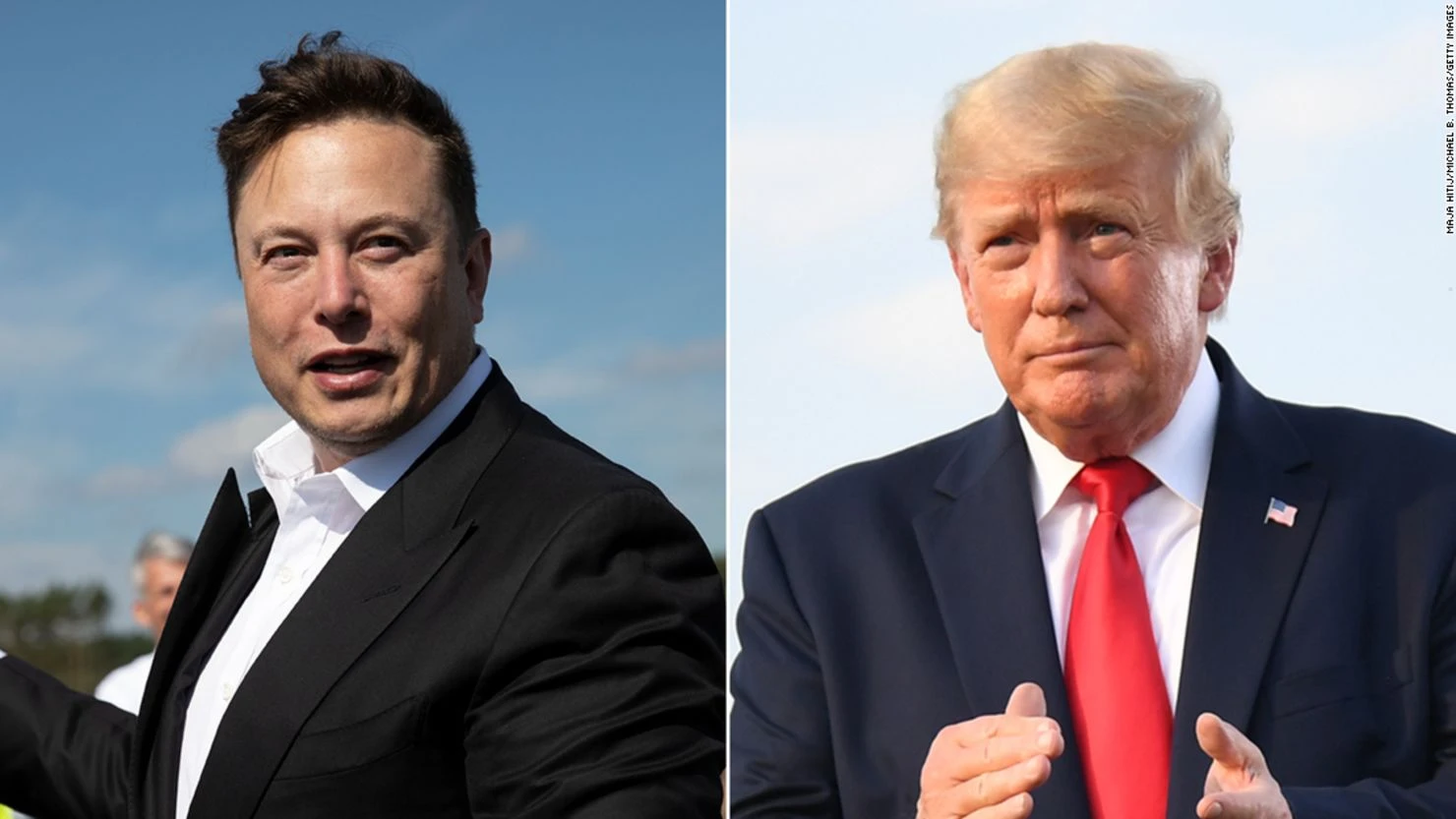
Tech Maverick & Rebellious Politician
The Subtle Threads: Twitter Privatization, A Masterstroke for Presidential Campaign Preparation
As we mentioned in our previous article, "How Did America's 'Crypto Patriarch' Trump Come to Be?", during his presidency, Trump viewed Twitter as his primary channel for external communication. However, the platform did not offer Trump any preferential treatment or support; instead, it regarded him as "one of the platform's unstable factors."
In May 2020, Twitter officials deemed Trump's statements potentially inciting violence and reviewed and blocked his tweets. Subsequently, Trump signed an executive order limiting social media's censorship powers.
In January 2021, Twitter announced that it had "permanently suspended" Trump's account due to the risk of further inciting violence _ (Odaily Planet Daily Note: This incident was triggered by the Capitol riot in 2021, during which Trump's Twitter followers exceeded 88 million)_. Following the riot at the U.S. Capitol, Facebook also suspended Trump's account.
The final result is that the social media platform, which has always advocated for "freedom of speech," unilaterally banned individual speaking rights. The account, as a platform asset, is controlled by the platform rather than the individual, even if that person is the President of the United States.
In response, Trump's reaction was — if you won't let me speak on Twitter, then I'll start my own social media platform with more freedom of speech; while Musk's reaction was more direct — if I find you displeasing, I'll buy you out and then manage and transform it according to my ideas, with me in charge, for my use.
In January 2022, Musk began steadily buying shares of Twitter, and by April of the same year, his stake reached an astonishing 9.13%, valued at $2.64 billion, making him the largest shareholder of Twitter.
Subsequently, on April 4, Musk disclosed his "Twitter acquisition plan" through an SEC 13G filing. On that day, Twitter's stock price saw its largest intraday increase since its IPO in 2013, with a peak increase of 27%. Following this news, the public widely believed that Musk's earlier statements in March questioning Twitter's commitment to free speech and hinting at plans to create a new social media platform were a smokescreen to release a large amount of shares.
On April 13, Musk proposed to buy Twitter for $54.20 per share, totaling $43 billion, taking full control. In a letter to the Twitter board, Musk revealed plans to turn the company into a private entity: "In its current form, (Twitter) will neither thrive nor meet the societal demands for (free speech)." In response, the Twitter board quickly initiated a poison pill plan _ (Odaily Planet Daily Note: This plan is generally aimed at limiting a single investor from holding more than 15% of shares without the board's approval, to avoid dominance in shareholding and shareholder decision-making)_. However, Twitter later stated it accepted Musk's proposal and agreed to sell.
Just when people thought the matter would conclude with "Musk successfully acquiring Twitter," the situation took a sharp turn, leading to another twist.
On May 13, in response to the news that "5% of Twitter's daily active users are bot accounts," Musk announced a "temporary pause" on the acquisition, causing Twitter's stock price to drop 10% that day. Although Musk later clarified that he would continue to push for the acquisition, this move still drew significant dissatisfaction from Twitter.
On May 25, an investor representing all Twitter shareholders filed a collective lawsuit against Musk, accusing him of manipulating Twitter's stock price to gain favorable conditions for acquisition negotiations — "Musk continuously made statements, tweeted, and engaged in actions that led the public to doubt the deal, causing the company's stock price to suffer a severe blow, thereby creating leverage he hoped to use to exit the deal or renegotiate the purchase price." In response, Musk announced through Twitter that the acquisition action was "temporarily paused."
On July 8, Elon Musk stated that Twitter had severely violated multiple agreement terms and decided to terminate the acquisition.
Just when many thought this matter would end in a farcical manner, things took a turn three months later.
On October 3, Musk's attorney announced the resumption of the acquisition, on the condition that Twitter must drop the lawsuit. At that time, Musk expressed his desire to create a "universal app" named "X" through the acquisition of Twitter, which would encompass various services including social media and payments. It is worth mentioning that Musk had repeatedly expressed optimism about WeChat in offline interviews and various events, and this move may have been influenced to some extent by WeChat.
On October 27, Musk successfully acquired Twitter for $44 billion, and after completing the transaction, he swiftly fired several executives from the "long-established social media platform," including the CEO, CFO, legal chief, and advisors. Additionally, in this multi-billion dollar acquisition, there were also the presence of crypto giants and venture capital firms — Binance and Sequoia Capital provided $500 million and $800 million in support, and Binance founder CZ had also stated his support; market rumors indicated that FTX founder SBF also intended to participate but was rejected by Musk himself.
On that day, Twitter officially delisted from the New York Stock Exchange, and the S&P 500 index was also removed, marking the end of the stock market for the once "king of social media," which concluded with privatization.
Subsequently, Twitter would become an important "propaganda front" and "information center," providing the strongest support for Musk's ambitions and the dissemination of his voice; at the same time, Trump would welcome his "most steadfast ally, support, and number one fan."
By the end of October 2022, according to media reports, Musk had fired Vijaya Gadde, the head of Twitter's legal policy who had previously decided to ban Trump's Twitter account (this executive was described by Fortune magazine as the most powerful woman in Twitter's executive team, earning $17 million in 2021).
In November 2022, although Trump stated he had no intention of returning to Twitter and insisted on using his own social platform "Truth Social," Musk still initiated a vote on Twitter regarding whether to restore Trump's account, and subsequently respected public opinion and restored Trump's Twitter account (51.8% of voters agreed to restore it).
Interestingly, in May of that year, the New York Post had reported that Trump had quietly "encouraged" Musk to acquire Twitter, which Musk later outrightly denied, calling it fake news and stating that he had no direct or indirect communication with Trump.
The first contact between the two can be traced back to December 2016, when Trump, after being elected president, met with Musk, Apple CEO Tim Cook, and Alphabet CEO Larry Page, among other tech company leaders, in New York. In January 2017, Musk attended Trump's manufacturing meeting alongside executives from Ford, Lockheed Martin, Whirlpool, Under Armour, and Johnson & Johnson, where they seemed to reach a consensus on issues related to American manufacturing, agreeing to reduce regulatory costs and encourage companies to produce products in the U.S.
Trump once invited Musk to serve as a White House business advisor, but the partnership lasted less than six months. Due to Trump's obstinate decision to withdraw from the Paris Climate Agreement, Musk believed this decision would hinder Tesla's push for clean energy, ultimately leading to their split, with Musk shifting his support to the environmentally inclined Democratic Party. Subsequently, their relationship plummeted to a freezing point, and there were even direct conflicts — Musk openly stated that Trump should step down, and Trump retorted sharply, "Musk came to the White House asking me to help his projects that rely on subsidies, whether it's electric cars that don't last long enough, self-driving cars that frequently crash, or rockets without destinations; without these subsidies, Musk would be worth nothing."
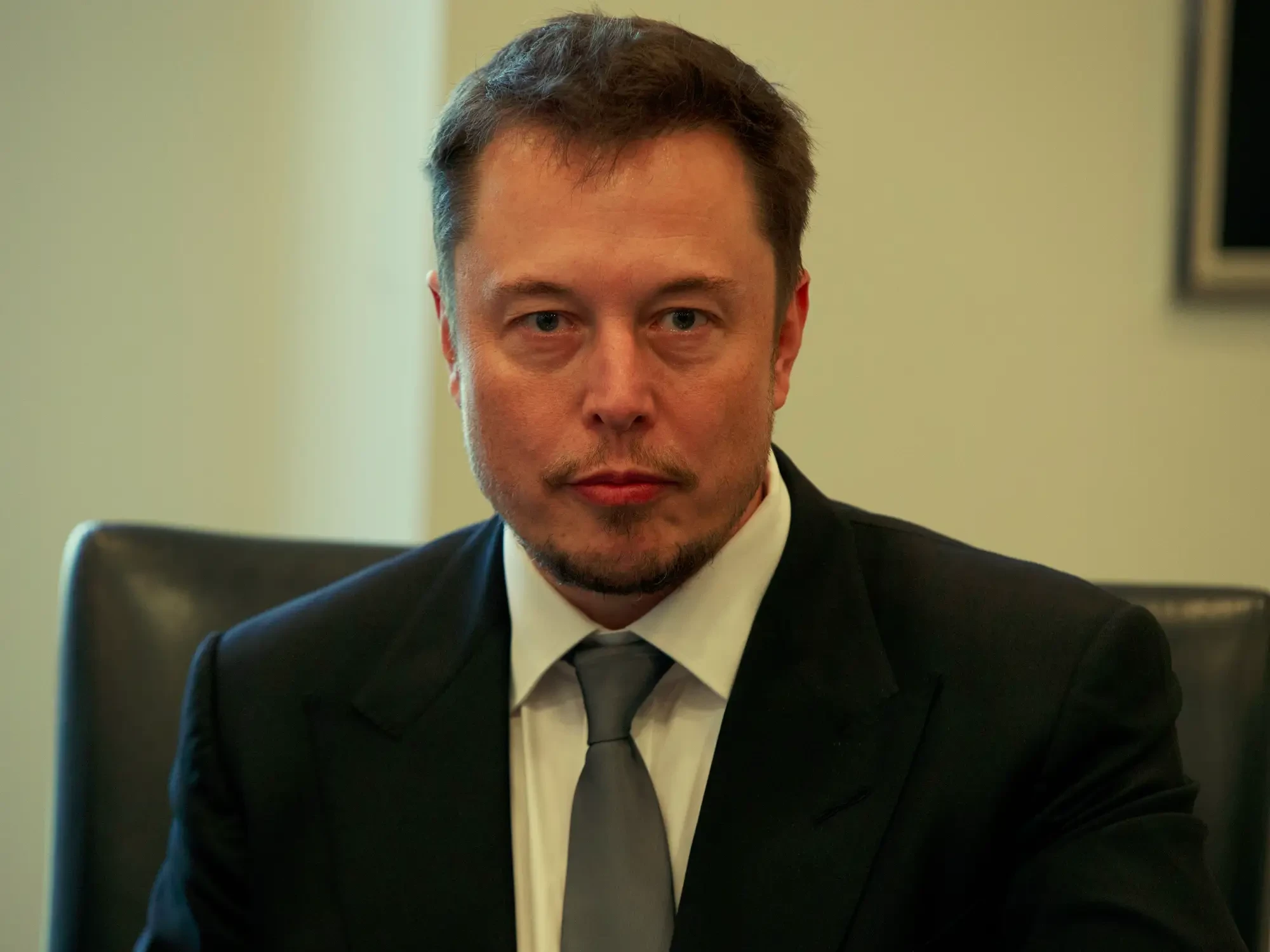
Musk attending the meeting in December 2016
But the world is unpredictable; former friends can become future enemies, and past enemies can become future allies.
In July 2023, Musk successfully renamed Twitter to X and gradually set its domain to X.com, which he had regained from PayPal.
In August 2023, Trump, who had been silent on X (formerly Twitter) for over two and a half years, posted again, featuring his "mugshot" taken during his surrender at the Fulton County jail in Georgia. The text on the image noted the date of his surrender and the charge of "overturning the election results," stating "never surrender," and soon, Musk would join the "Trump camp," becoming a member of the team "fighting for American freedom and democracy."
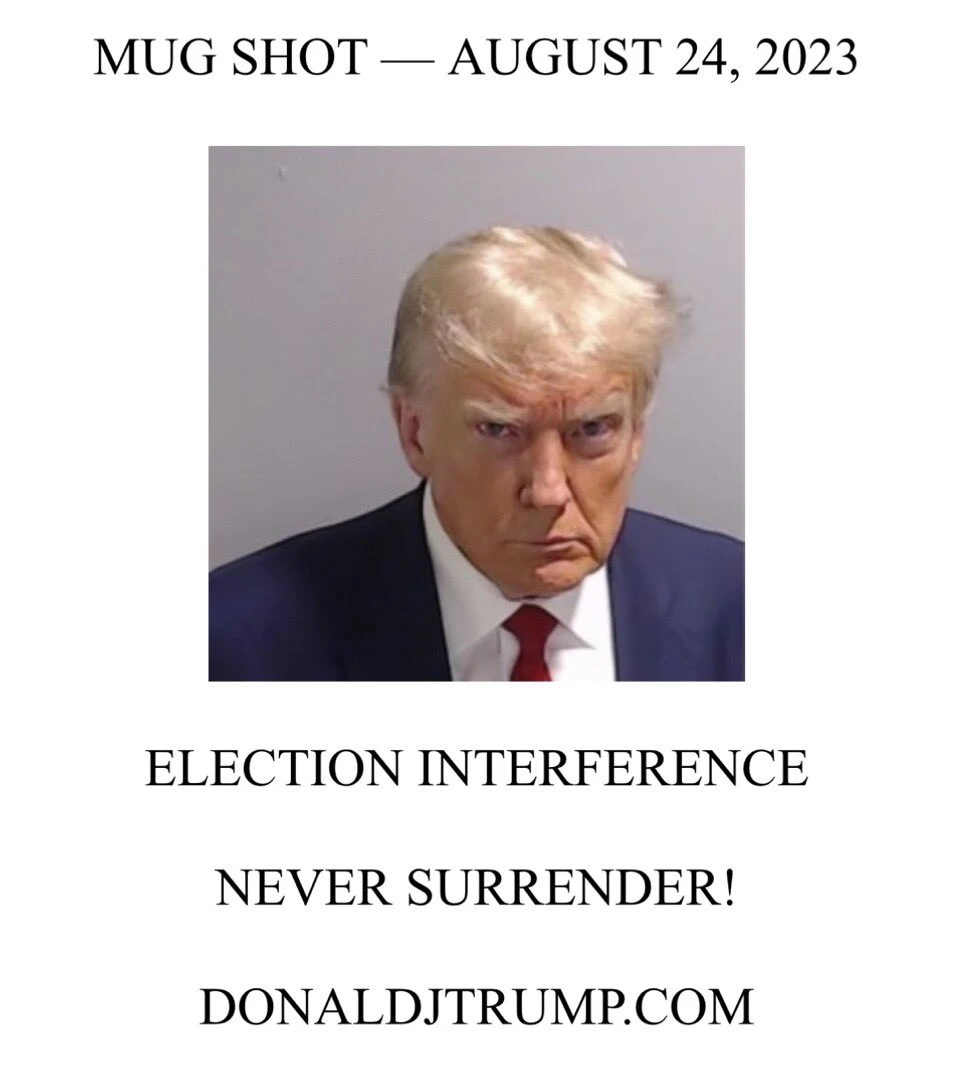
Trump's first post on X with an accompanying image
It is worth mentioning that in Musk's personal biography published in 2023, "Elon Musk," he stated: "I think it's important to have an inclusive and trustworthy digital public space (Musk had stated in October 2022 that Twitter should become a fair forum for inclusive discussions of differences)," and then he paused and added, "Otherwise, how can we help Trump get elected president in 2024?"
Some say, "Those who think one step ahead are ancestors, while those who think ten steps ahead are martyrs." In the presidential campaign, where a slight misstep can lead to deviation, Musk had already begun laying down his own "dark chess" years ago, which would become a crucial step in determining whether Trump could return to the White House and assume the presidency.
The enemy of my enemy is my friend: Before the presidential throne, wealth is the best ladder
As we enter 2024, it is once again the long-awaited "election year." Whether the Republican Party can reclaim the presidency from the Democratic Party and whether the Democratic Party can defend its governing position will make this presidential election a crossroads that determines the direction of the United States and even the world for the next four years.
With news such as "the Bitcoin spot ETF was officially approved in January" and "March data showing that the number of cryptocurrency users in the U.S. surpassed 52 million in 2023, accounting for 20% of the adult population," the importance of the cryptocurrency industry in this election has become increasingly significant.
As a Republican presidential candidate, former President Trump, who once shouted “Bitcoin is a scam”, has also joined the ranks of "Bitcoin enthusiasts" —
In February, Trump stated that “CBDC (Central Bank Digital Currency) is extremely dangerous.”
In May, reports indicated that Trump had inquired whether Bitcoin could help solve the existing $35 trillion U.S. debt problem; additionally, he announced that he would officially accept campaign donations in cryptocurrency and expressed: “Biden doesn’t even know what cryptocurrency is; if you like cryptocurrency, you better vote for Trump.” He also promised to stop the U.S. hostility towards cryptocurrency and embrace it.
In June, Trump became the first U.S. president (candidate) to accept campaign donations via Bitcoin's Lightning Network; he then stated: Bitcoin mining could be the last line of defense against CBDC. I hope all remaining Bitcoins are made in the USA, which will help the U.S. dominate energy.
In July, Trump faced an armed attack at an outdoor campaign rally in Butler, Pennsylvania, narrowly escaping death. According to eyewitness accounts, “the bullet whizzed past Trump’s ear, shattering the glass of the teleprompter on stage.” Analysts noted that after the shooting, the market surged towards Bitcoin and other non-traditional safe-haven trades. Meanwhile, this incident marked a turning point in American political norms and the emergence of greater political violence. Nevertheless, Trump attended the 2024 Bitcoin Conference held in Nashville, Tennessee, as previously agreed in late July, and spoke: **According to current trends, Bitcoin will have the opportunity to surpass gold in market value; Bitcoin is as important as the steel industry was 100 years ago, and we must achieve maximum success in this field; Bitcoin is not a threat to the dollar; the current government is; the Biden team has wasted a lot of money; Bitcoin is going to the moon, and I hope America stays ahead, leading the trend and becoming the "crypto capital"; Bitcoin supporters understand inflation better than anyone; the Biden administration has let inflation run rampant, and I will control inflation and rebuild the "American Dream"; I will initiate a national Bitcoin reserve plan. Ultimately, Trump’s campaign team successfully raised $21 million in campaign funds at this conference. *_ (Odaily Planet Daily Note: For more of Trump's speech at the Bitcoin Conference, see “Full Text of Trump's Bitcoin Conference Speech: Establishing a Bitcoin Strategic Reserve, Firing Gary Gensler”.)*
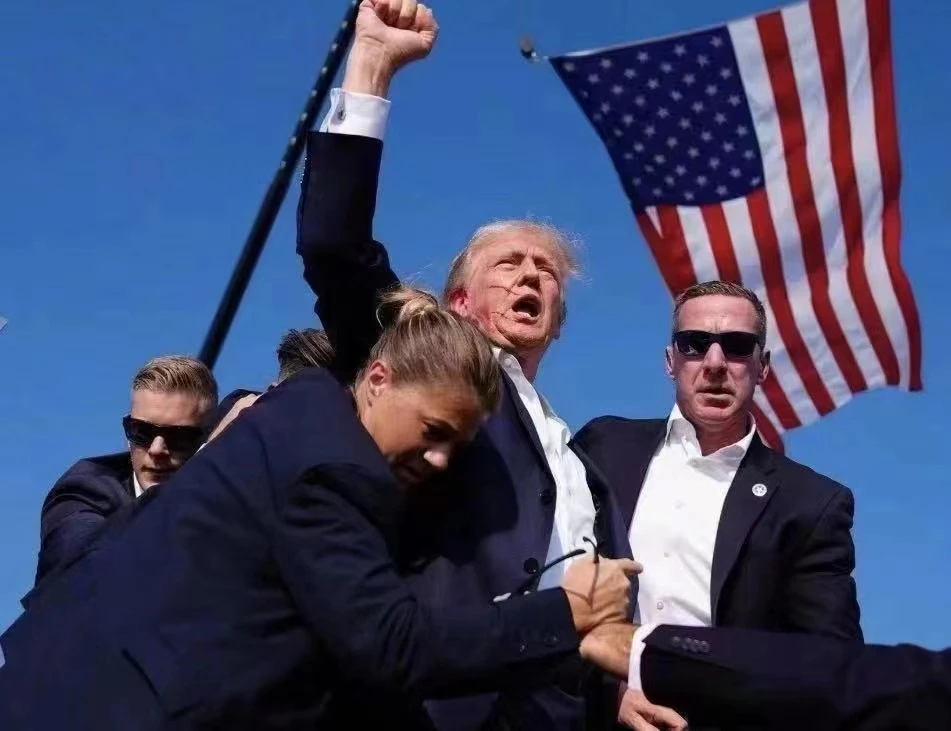
Trump raising his arm after the assassination attempt
The subsequent story is well-known; current President Biden lost his qualification as the Democratic presidential candidate amid a backdrop of loneliness and ridicule due to his poor performance in the first election debate and a series of prior reasons. Vice President Kamala Harris officially took over in early August, becoming the new Democratic presidential candidate.
In August, some opinions suggested that if Harris were to defeat Trump, the price of Bitcoin might be negatively affected, and her election would be bearish for Bitcoin.
Individuals and organizations, including Fundstrat co-founder, asset management giant Bernstein, and Standard Chartered Bank, subsequently stated that if Trump were elected president, the price of Bitcoin would soar, potentially reaching $90,000 or even $125,000 by the end of the year. _ (Odaily Planet Daily Note: In hindsight, Bitcoin's price has now surpassed $90,000, making the predictions a reality.)_
If Trump's conflict with the Democratic Party was due to the struggle for the presidential throne and the previous defeat in the 2020 election, the conflict between Musk and the Democratic Party is somewhat more complex.
To elaborate, Musk's dissatisfaction with the Democratic Party may stem from the following three aspects:
First, the Democratic government's relatively stronger regulatory policies are in stark contrast to Musk's beliefs in accelerationism and technological innovation, which is a fundamental ideological conflict with no room for compromise.
Second, the Democratic Party's long-standing unfriendly, even suppressive attitude towards cryptocurrency sharply contrasts with Musk's pro-cryptocurrency stance. Musk's attitude towards cryptocurrency is undoubtedly more open and inclusive, believing that Bitcoin, Ethereum, DOGE, and others have their unique value (for more on Musk's views on cryptocurrency, see “Decoding Musk's Views on Cryptocurrency: It's Not Just Play”). Even as early as 1999, at the beginning of his second entrepreneurial venture with X.com, Musk stated in an interview with CBS MarketWatch: “I think we are now in the third phase, where people are ready to use the internet as their primary financial repository.”
Third, there is a more speculative personal reason — Musk's son Xavier, possibly influenced by the Democratic Party's promotion of "gender liberalism," underwent gender reassignment surgery in 2022, becoming a member of the sexual minority community and changing his name to Vivian Jenna Wilson, taking his mother's surname. According to Musk himself, “I was basically tricked into signing (gender reassignment-related) documents for my eldest son,” and it was only after this incident that he understood what had happened. This occurred during the pandemic, so many things were chaotic, and he was even told that this child (referring to Musk's son) might commit suicide. Furthermore, the entire gender reassignment process was conducted on a child “far below the legal age,” and he stated, “This is incredibly evil; anyone advocating for this process should be imprisoned.” A month after the documents for his transgender daughter's name and gender change were submitted, Musk announced his support for the Republican Party.
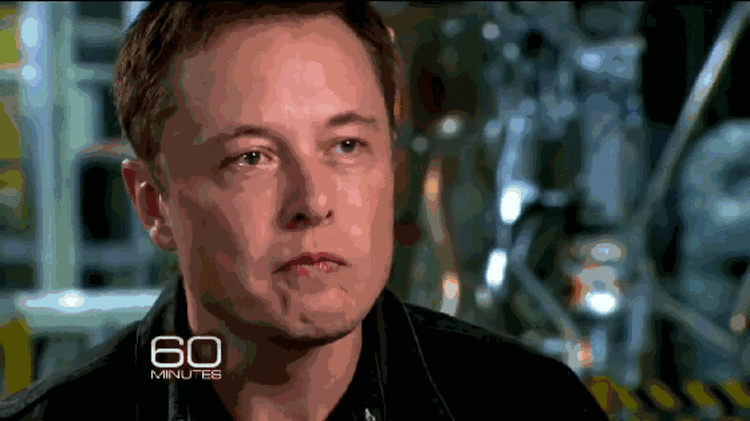
Musk with tears in his eyes
It is noteworthy that Musk and the Democratic Party have a long-standing grudge — as early as April 2022, when Musk proposed to acquire Twitter, Democratic Senator Warren raised concerns that “Musk's deal with Twitter is dangerous,” attempting to organize against Musk's acquisition. After this year's election, Musk retweeted a previous interview clip —
In an interview with TCN, American journalist Tucker Carlson asked Musk, “How much pressure did shutting down the X platform put on you?”
Musk replied, “Aside from several Democrats saying they wanted to put me in jail, cancel my government contracts, nationalize my company, deport me as an illegal immigrant, and arrest me because I’m Putin’s best friend, not much.”
He then retweeted with a comment: “Of course, these things put a lot of pressure on me, but compared to President Trump, it seems trivial; they tried to kill him twice, bankrupt him, and imprison him forever.”
It is evident that Trump's successful election finally allowed Musk to breathe a sigh of relief, and the stone that had long weighed on his heart finally fell. His previous efforts of “putting in people, effort, and money” were not in vain.
Statistics show that in addition to physically campaigning across the U.S. for Trump, Musk invested over $130 million and a significant amount of time and promotional resources, including those from the X platform, to support Trump and the Republican Party (there are also reports that Musk's super PAC spent about $200 million to help Trump campaign for the presidency).
According to documents from the Federal Election Commission, Musk donated $75 million to the America PAC, a political action committee supporting Trump; Trump also mentioned that “Musk will donate $45 million monthly to support Trump’s campaign.” Although this news was later denied by Musk himself, it illustrates the extent of his support for Trump. Additionally, during a campaign speech in Pennsylvania, Musk urged voters to use various campaign signs to express their support for Trump, in order to avoid the “spiral of silence” that might prevent them from voicing their opinions. He also announced that from October 19 until Election Day on November 5, he would randomly distribute $1 million daily to eligible voters who signed the “America PAC petition” _ (Odaily Planet Daily Note: This petition supports freedom of speech and the right to bear arms) _; the first winner of the day had already been announced.
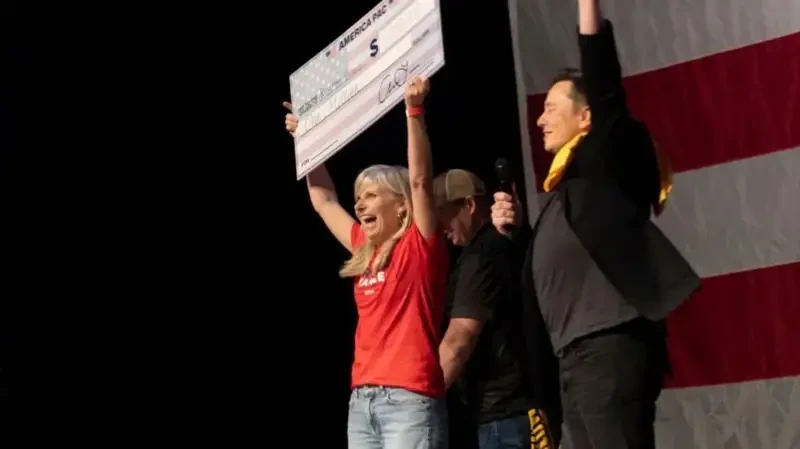
Musk generously spent $1 million that day
When the mystery of “who will occupy the presidential throne” was revealed, Trump and Musk ultimately became the “ones who laughed last.” The next step was, naturally, the expected “reciprocal gesture.”
The Future of America Towards Conservative Politics and Accelerationism: Trump and Musk, Together in Power
After the dust settled, it was naturally time to “divide the spoils.”
On the evening of November 5, North American time, Trump delivered a victory speech to the nation on election night. In addition to thanking his running mate, Vice President Vance, as well as family, friends, and supporters, Musk became the most mentioned “thank you” recipient, emerging as the undisputed “biggest winner” of the night.

Musk turned the X platform into Trump’s “campaign base”
Trump remarked: “Musk is a rising star who did a lot of campaigning during the election.” He also praised Musk’s technological achievements, particularly the successful launch and safe recovery of rockets by SpaceX, as well as the significant assistance provided by Musk’s Starlink communication satellites during recent hurricane disasters and extreme flooding in North Carolina. Finally, Trump stated: “Musk is a super genius, and America must protect talented individuals like him.”
Undoubtedly, this speech laid a solid foundation and friendly tone for future cooperation between the Trump administration and Musk’s various companies. According to Fortune magazine, the companies and avenues benefiting Musk subsequently include:
Government-related contracts for SpaceX and Starlink;
The Federal Trade Commission (FTC) investigation into whether the X platform violated FTC data privacy agreements;
Regulatory impacts and innovation support policies affecting companies including xAI, The Boring Company, Neuralink, and Tesla.
After Trump’s victory, Musk’s personal wealth also surged, marking a new round of skyrocketing:
On November 7, after Trump won the U.S. presidential election, Tesla (TSLA.O) rose 14.75% on Wednesday, increasing Musk’s wealth by $20.9 billion in a single day, bringing his total assets to $285.6 billion, far surpassing Jeff Bezos, who ranked second on the global billionaire list. On the 8th, Musk’s wealth continued to climb, rising nearly $5 billion from the previous day.
On November 12, Tesla (TSLA.O) rose nearly 9% on Monday, pushing Musk’s wealth to new heights, with a single-day increase of $16.2 billion, bringing his total assets to $320.2 billion.
In addition, the government efficiency department positions previously agreed upon by Musk and Trump were officially approved, surprising those who believed that “Trump would not satisfy Musk’s demands for power, and the two would turn against each other after the presidential campaign ended”.

Musk announced the arrival of DOGE
On November 12, North American time, Trump posted on the X platform stating that Musk and Vivek Ramaswamy, founder of the pharmaceutical company Roivant Sciences and American entrepreneur, will co-lead the proposed government efficiency department (abbreviated as D.O.G.E), which will aim to reduce bureaucracy and cut wasteful spending, enhancing accountability and efficiency in federal agencies. Latest news indicates that the official X account for the government efficiency department has been launched, with the handle @DOGE.
As Musk previously stated: “All actions of the government efficiency department will be published online to achieve maximum transparency. If the public believes we have cut important expenditures or failed to reduce wasteful spending, we welcome feedback. We will also list the most ridiculous tax expenditures. It’s tragic, but also very interesting.”
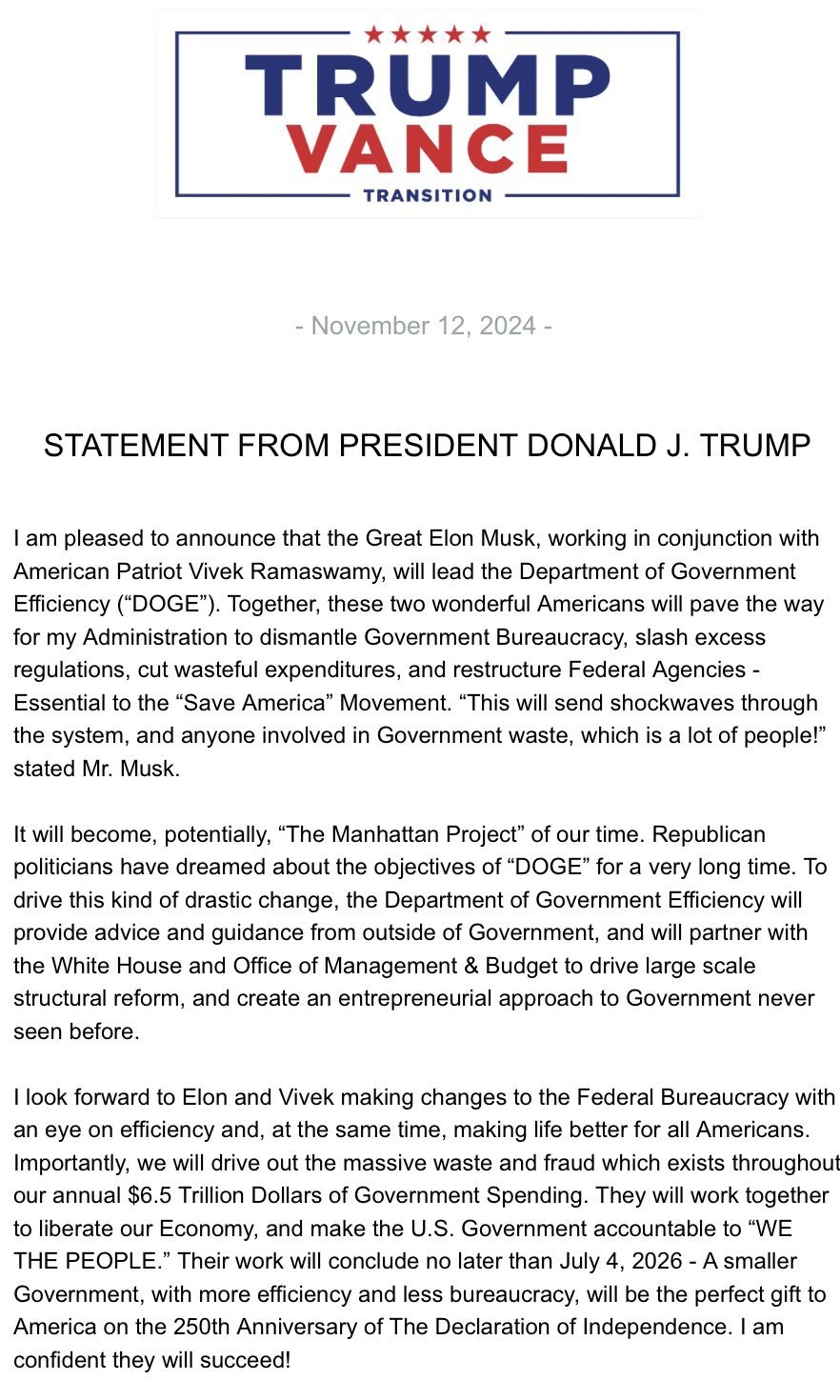
Trump’s personal appointment letter
All signs indicate that the future direction of American political economy will largely depend on the decisions of the newly elected President Trump and his “number one fan” Musk.
Thus, the United States, combining conservative politics and accelerationism, is about to enter a four-year (or longer) period of governance by the “Trump & Musk duo.” Whether this is a blessing or a curse, right or wrong, only time will tell.
Conclusion: After the Crisis, There is a Future
In the end, perhaps Musk’s words during his speech in Fortson Town are worth revisiting and reflecting upon. He said: “I was not politically active before. I am now actively involved in politics because I believe the future of America and civilization is at stake.”
In other words, it is precisely because he sees the precarious situation facing American politics that Musk stepped forward to fight for his future, America’s future, and even the future of Western civilization. This is also his consistent life attitude — to face challenges and crises head-on; only in this way can one see the direction of the future.
In the not-so-distant future, after Trump officially takes office as President of the United States, Musk may face more challenges, including “presidential intervention in Federal Reserve policy,” “SEC chair and cryptocurrency regulation,” and more boundaries in the field of technological innovation regulation. How they will handle these remains to be seen.
But for now, we can be certain that — those who have weathered the storm, after passing through, have a completely different mindset.
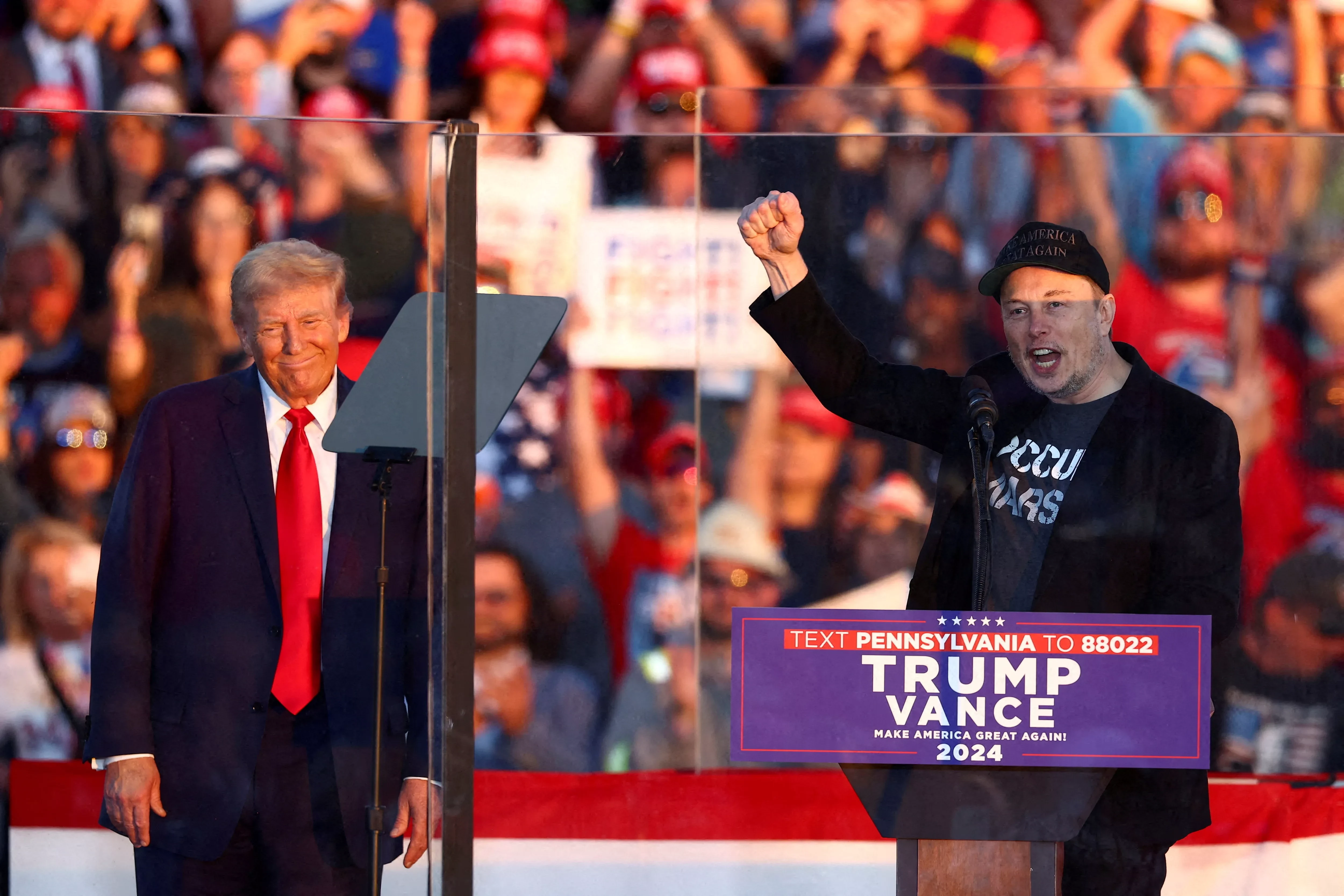
Scenes from the Trump & Musk campaign event
免责声明:本文章仅代表作者个人观点,不代表本平台的立场和观点。本文章仅供信息分享,不构成对任何人的任何投资建议。用户与作者之间的任何争议,与本平台无关。如网页中刊载的文章或图片涉及侵权,请提供相关的权利证明和身份证明发送邮件到support@aicoin.com,本平台相关工作人员将会进行核查。



